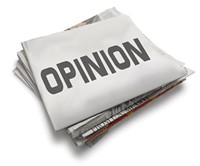You're Welcome
We need to bring back the handwritten thank-you note
When I was a kid, the choreography of Christmas morning required that my brother and I take turns unwrapping gifts at an exasperating pace so my father could make a list of what each package contained and who had given it. The list was long because the gift-giving protocol in our family extended to aunts, uncles and cousins. A few days later, after all the Hershey's Kisses were eaten and the Christmas tree had begun to drop brittle needles on the floor, my mother was hounding us to get thank-you notes in the mail.
I hasten to add that "Thank you for the gloves" did not pass muster. Our thank-yous had to measure up to those of my cousins—Kay, Sharon and Judy—who lived in Oregon. Theirs were more Jane Austen than Ernest Hemingway, rendered in perfect script with a fountain pen, replete with enough narrative detail to please even the most jaded giver of gifts. To wit: "The cute cap-sleeved top you sent perfectly matches the navy-blue jumper I got for my birthday, so when I wear them both to the church social next week (with the shiny black Mary Janes that Mom bought me!!!), I'll surely be the center of attention." So, however reluctantly, my brother and I followed suit.
Since then, handwritten thank-yous have gone the way of "good manners" and cheap gasoline. Wedding presents, when acknowledged, often generate a wan "Thank you very much for the lovely gift" from newlyweds who would prefer to text "thx" and be done with it. Miriam Footer, the owner of WriteImage on 2100 South, reports that some couples come to her store to order pre-printed, generic thank-yous, an order she declines to place. Indeed, the handwritten thank-you is so neglected that job applicants are urged to follow up interviews with one so as to distinguish themselves from the herd—a clever stratagem, it seems to me.
I occasionally pen a thank-you note for a gift or a kindness, and I certainly am appreciative when something I do is acknowledged in writing. Most of the response to what I write in this space arrives electronically, glints in the cyber dross. For the most part, the messages are hastily composed with more exclamation marks than commas. I read them. Whereupon—according to the Emily Post Institute, the arbiter of etiquette for decades—I have but two categorical options: "delete" and "remember." Only once have I chosen "remember." A prominent Salt Lake City businessman wrote to me on crimson-bordered stationery with his name embossed at the top. A year has passed and I can't bring myself to throw it away—because it has the same sensory engagement as newsprint, books and vinyl LPs, and because someone I don't know took time to compose his thoughts, find my address, and put pen to paper then stamp to envelope.
Footer says I am responding to his sincerity. "E-mail isn't appropriate for a sincere thank-you," she says. "A written note acknowledges effort sincerely and carries so much more weight."
A written note has reciprocal benefits, according to John Kralik, a 50-something attorney who believes the act of writing thank-you notes can improve your life. In 2007, when his life had become "perfectly awful," he committed himself to writing one thank-you note each day for a year. It proved to be a difficult commitment to honor, and he wrote a book about the experience titled 365 Thank Yous. In it, he writes about the struggle to become more observant and more engaged with his surroundings. He had to learn to focus on people like the Starbucks barista whose service is ordinarily overlooked.
At the end of the book, Kralik describes a karmic chain of events in which "the best thank-you notes will stir in the recipients' hearts the knowledge that their gesture was truly appreciated and even inspire the desire to give again, knowing that they will be thanked and appreciated." It is the identical point that behavioral economists Armin Falk and Urs Fischbacher have made in their studies. In describing the Theory of Reciprocity, they observe that "people evaluate the kindness of an action not only by its consequences but also by its underlying intention." A thoughtful act tends to short-circuit the recipient's governing self-interest and spark the human tendency to repay kindness with kindness, smile with smile. Studies show that friendly servers get bigger tips.
My mother wrote thousands of letters in her lifetime. The handwritten letter was her preferred medium for communicating with friends, relatives, banks, hospitals and the like. I doubt she gave much thought to underlying intent, and if she had any notion of reciprocity at all, it was intuitive and elemental: send a letter, receive a letter; receive a gift, send a thank-you. It was a practice she inculcated in her two sons. She believed, as Footer asserts, that "kids should be taught that a gift requires a thank-you note, even if it is one 8-year-old writing to another."
Maybe Jimmy Fallon will get credit for the resurgence of the handwritten thank-you if and when it comes. Like Johnny Carson's Carnac routine and David Lettermen's Top 10 list, Fallon's funny thank-you cards ("Thank you, bowling, for giving me an excuse to drink with somebody else's shoes on") are a favorite of the studio audience. Notecards could become as popular as Fallon himself, even fashionable to the point that yuppies tuck embossed vellum note cards into their Dior totes as they head out for coffee. Then, lingering over a latte, Mont Blanc pen in hand, they compose a thank-you note to the barista.
Latest in Opinion
Readers also liked…
-
Russian Army Conscripts Asking, 'Where's Our Underwear?'
Smart Bomb: The completely unnecessary news analysis.
- Dec 21, 2022




